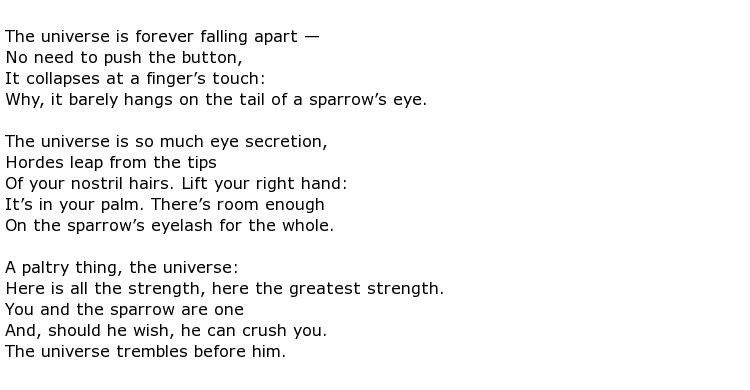I concede that anger at points of view and style of leadership different from mine is rife and rampant in the United States these days. My anger and others' anger. Anger is the winter, cold and stiff, that resides in the psyche throughout the year.
We disagree. But we have to make our way through every disagreement so as to commonly dwell with one another.
We are becoming takers, more and more. It only counts if you "have" -- read "take". The have-nots are considered expendable.
And by "gods" I hear the nascent interior goodness within everything urging emergence into the outer world.
We don't own that which we are part of -- we only believe we own that which is not us. I don't own my hand, my leg, my ear. It is our profound illusion that we own land, things, other people, that which we call "possessions."
We don't.
Never will.
We only share existence with everything.
Respected, and worthy.
We disagree. But we have to make our way through every disagreement so as to commonly dwell with one another.
And yet people fight incessantly. Even though war is blessedly absent in most countries today, these are deeply polarized times. Words too often are delivered with contempt; philosophical differences are likened to warfare; those who simply disagree with another are deemed “enemies.” Often it is on the Internet — which was launched as a forum for unity — where people attack one another, under the cloak of anonymity.
This state of constant conflict is a major source of stress and unhappiness for millions of people. Is there a solution?
We believe that the answer is yes. Further, as is the case with all big problems, within this crisis lies an opportunity. Polarization contains the seeds for personal excellence and spiritual advancement.
To begin with, the solution is not for people simply to agree with each other, or to prevent disagreements from occurring. There is nothing wrong or inherently destructive about having ideas that differ from those of others. On the contrary, disagreement is necessary in a pluralistic society to find the best solutions to problems. The ability to disagree freely is one of the great blessings of modern democracy.
The solution — and the opportunity for each of us — lies not in disagreeing less, but in understanding the appropriate way to disagree with others, even when we are treated with hatred. A valuable clue can be found in the words of the 8th-century Indian Buddhist master Shantideva in his text “A Guide to the Bodhisattva’s Way of Life”: “Unruly beings are as unlimited as space / They cannot possibly all be overcome, / But if I overcome thoughts of anger alone / This will be equivalent to vanquishing all foes.”
(--from, The Dalai Lama and Arthur Brooks: All of us can break the cycle of hatred, The Washington Post, 3/11/19I apologize for my bellicosity and arrogance against, especially, men like Trump, McConnell, Ryan, Jordan, the majority of Republican pragmatists unwilling to bite the hand that feeds them, and the news agencies and radio commentators that feed the minds that control the hands that feed the cadre of true believers so as to attract advertisers that fund the generous salaries of the prognosticators and prevaricators.
We are becoming takers, more and more. It only counts if you "have" -- read "take". The have-nots are considered expendable.
"The takers are those who know good and evil; and the leavers are those who live in the hands of the gods." (--Daniel Quinn, Ishmael)Quinn suggests that the world doesn't belong to us but that we belong to the world. By "world" I hear universe, earth, nature.
And by "gods" I hear the nascent interior goodness within everything urging emergence into the outer world.
We don't own that which we are part of -- we only believe we own that which is not us. I don't own my hand, my leg, my ear. It is our profound illusion that we own land, things, other people, that which we call "possessions."
We don't.
Never will.
We only share existence with everything.
Respected, and worthy.
Consider the relationship between dignity and conflict described by Donna Hicks, a Harvard conflict–resolution expert who has worked on the conflicts between Israelis and Palestinians and in Northern Ireland and Colombia. Over decades in the field, Hicks saw a repeating pattern: conflicts came about when people felt they were being disrespected and treated as worthless. “We long to look good in the eyes of others, to feel good about ourselves, to be worthy of others’ care and attention,” Hicks writes. When people are treated as if we don’t matter or aren’t due respect, we become vindictive, tribalistic and vengeful. “Research suggests that we are just as programmed to sense a threat to our dignity as we are to a physical threat,” Hicks writes. “Neuroscientists have found that a psychological injury such as being excluded stimulates the same part of the brain as a physical wound.”
(--The Internet Can Make Us Feel Awful. It Doesn't Have to Be That Way, BY ELI PARISER JANUARY 17, 2019, Time)
Try presencing.
There is kindness.
And there is the absence of kindness.
If we choose kindness, we are present.
Presence embraces absence and brings it home.


